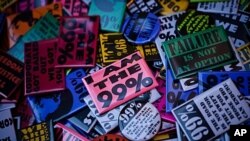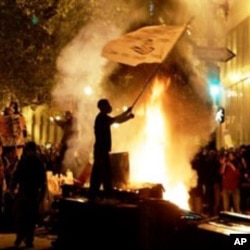The Occupy Wall Street movement has been growing and changing since mid-September. Their message is simple: Corporations have too much influence in the American government. Greed has derailed democracy.
But is that all they stand for? Are there deeper motives than redistribution of wealth? Are people protesting for moral or spiritual reasons?
From the streets
We went to the Occupy Baltimore camp in McKeldin Park. The camp was mostly quiet - most of the protesters were sleeping after being up late the night before demonstrating. A few Occupiers were up, working the media desk, posting to facebook, or even playing video games.
We spoke with Damien Nichols, his friend Samantha Cuff and 21-year-old Army veteran Justin Carson, who was working on the movement’s website.
Damien, a 29-year-old graduate of the University of Maryland who majored in politics and government, said the Occupy movement wants to “reboot democracy.”
“If City Halls and Washington, D.C. are the gatekeepers for our political representation and we don’t believe that they are currently representing us, then what we’ve done here is we’ve all come out in our major cities, including Washington, D.C., and started a conversation amongst ourselves to see what needs to be done about it,” he said.
Samantha said that she believes people are trying to “get back in touch with their humanity.”
“And I think that, is kind of what this is about for some people, is that ‘You know, yeah, the One Percent, they’re subjugating us,’ and all that, but how many of us would gladly accept a million dollars to do a dirty deed, you know? And it’s about fighting that ‘One Percentism’ within ourselves and not just outside of ourselves,” she said.
The Occupy movement refers to those who hold the most wealth - a group that makes up about one percent of the American population - as “the Once Percent.” The Occupy movement says it represents the “99 percent” - those outside the top one percent of wealth holders.
Civil religion?
Next, we visited Catholic University in Washington, D.C. Dr. Christopher Born of the School of Theology and Religious Studies specializes in the sociology and economics of religion. He said that the Occupy movement is looking to change the American Civil Religion - the basic values of American society.
“But I think they want a general change in the way Americans view America,” he said. “And so they want sort of their version of civil religion to become the paramount version of civil religion - instead of right now you have this - sort of the civil religion of the bankers and the one of everyone else.”
Ancient perspective
Next, we went to Agudas Achim congregation, a conservative synagogue in Alexandria, Virginia. That’s where Rabbi Jack Moline told us that Americans corporations, political leaders, and protesters need to take responsibility for how they treat one another.
“And so all of these questions have to be filtered through the question of ‘what is my responsibility to my fellow human being, to the society in which we live, and to the world with which we have been entrusted by God,’ ” he said.
Voice of one
Next we traveled to Washington’s old Tivoli Theater, to the offices of Sojourners. Tim King, the communications director, visited the original Occupy Wall Street site in New York, and says the movement has changed the way Americans view social justice issues.
“And so all of these issues are being raised and have a priority right now in our national discourse and discussion that it hasn’t had before. So that conversation is already changing,” he said.
From Muslim perspective
We also spoke with resident Imam Talib Shareef from Washington, D.C.’s Masjid Muhammad congregation. He said though he has not had direct contact with the protesters at Washington’s McPherson Square and Freedom Plaza, he is advising his congregation to pursue a peaceful path.
“I have advised my congregation to always seek peaceful means, a peaceful recourse,” he said.
“The cause of peace, the cause of peace and justice is on the side of peacemakers. The bottom line is to seek the path of peace; if you seek the path to peace, then that limits any potential for there to be violence. And when the violence comes in the movement that you are seeking, in terms of your aspirations, is overshadowed at that point,” Imam Shareef added.
Hope for future?
No one we spoke to would predict whether Occupy Wall Street will influence next year’s presidential election. The people we spoke to also say the movement needs a clearer mandate than “changing corporate greed.” Demonstrations continue and even a march on Washington is reported in the works.
Recently there have been more violent confrontations between Occupiers and police - in Oakland, some protesters fought with riot police, trashed storefronts and started fires.
Police in Portland, Oregon and Salt Lake City, Utah have also clashed with demonstrators. There have been arrests and one 35-year-old man fatally shot himself in a tent last week in Vermont. The cost of protecting protesters - in overtime for police and extra patrols, as well as cleanup and sanitation at campsites - has become an issue. There have also been deaths and at least one reported rape.
Winter is also coming in many major cities. But it is an open question whether Occupy Wall Street will make lasting change in America’s values.





